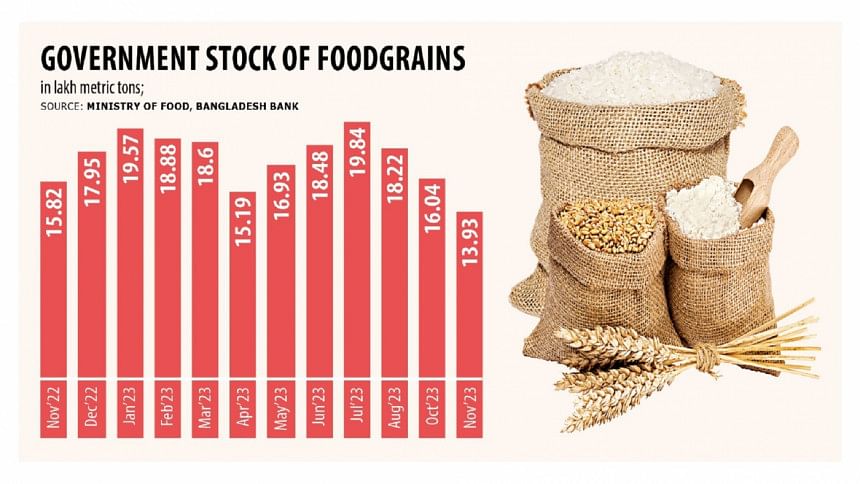Food welfare expands as election looms

Public food distribution rose more than 23 percent year-on-year in the first five months of 2023-24 amid higher inflation, as the government expanded the populist measure ahead of the national election.
Data from the food ministry showed that 12.92 lakh tonnes of rice and wheat were distributed under various schemes such as the Open Market Sales (OMS) and the Food-Friendly Programme as of November 23 of the current financial year. It was 10.50 lakh tonnes during the same period in 2022-23.
"The election is a possible factor for the higher food distribution," said Prof Selim Raihan, an economist, referring to the January 7 parliamentary polls.
An elevated level of inflation for the past 18 months has emerged as a matter of concerns for the government as it came under heavy criticism for failing to deal with higher consumer prices, which have eroded the buying capacity of the low-income groups and the marginalised.
Food inflation stayed above 12 percent for the third straight month in October, the highest in a decade, according to the Bangladesh Bureau of Statistics.
"Since the surge of inflation, economists have recommended the government expand food distribution to offer much-needed relief to people," added Raihan, also the executive director of the South Asian Network on Economic Modeling, a think-tank.
Because of the higher food distribution, the food stock of the government reduced to 13.93 lakh tonnes as of November 29, which was 15.82 lakh tonnes on the same day a year earlier. The stock averaged 18-19 lakh tonnes in recent months, food ministry data showed.
Once a food stock of 10 lakh tonnes was assumed to be enough for the country, but now it should be 10-15 lakh tonnes considering the higher population, said Quazi Shahabuddin, director-general of the Bangladesh Institute of Development Studies.
"So, the current food stock of Bangladesh is okay."
He describes the public food stock system as a tunnel, which is filled up on one side and it is distributed from the other side.
"Due to higher distribution, the food stock has gone down but it will go up after Aman procurement."
An official of the food ministry said the government has distributed food in large quantities in recent months in order to alleviate the woes of the people, resulting in a reduced food stock.
"As the Aman production has been high and the government is going to buy rice soon, the stock will receive a boost."
The government has prioritised the adequate distribution of food under various programmes ahead of the national polls and has allocated funds for food subsidies so that distribution runs smoothly.
Under the OMS system, the government distributed 4.39 lakh tonnes of rice and wheat in July-November, which was 2.92 lakh tonnes during the identical five-month period a year earlier.
Through the Food Friendly Programme, it provided 4.15 lakh tonnes of wheat and rice, again up from 2.85 lakh tonnes in FY23.
The food distribution rose sharply under several food-related relief schemes: it was 1.64 lakh tonnes in July-November compared to 27,658 tonnes a year ago.
Amid the growing demand for increasing subsidised supplies, the Trading Corporation of Bangladesh (TCB) has resumed selling food items through trucks after a pause of nearly 18 months, said Brig Gen Md Ariful Hassan, chairman of the TCB, recently.
TCB trucks are currently be found in 30 spots across Dhaka, collectively selling 72 tonnes of goods daily.
Despite the lowering of public food stock, there have not been any imports of rice. This is because the country has no deficit in rice, Shahabuddin said.
"Moreover, we have potential to take home a bumper production."
He said when the country faces natural disasters and crops are damaged, it needs to buy rice from international markets. Fortunately, there has been no such disaster in Bangladesh this year.
Chitta Majumder, a rice trader, said sales of rice were low this year and traders have not been able to sell all of the rice imported in the previous year.
In November last year, the government said Bangladesh must grow food in every inch of land, go for savings and practise austerity to avert a famine that international organisations fear may grip the world in 2023.
When the government warned of a potential famine, traders went for the import of rice. However, rice sales are low now, Majumder said.
The noted trader is not importing the food grain at this moment. Moreover, higher production of Aman, the second-biggest rice crop in Bangladesh, is also a reason for the lower purchase from global markets, he said.
In the first five months of FY24, no rice was imported by the private and public sectors. The import stood at 10.55 lakh tonnes in FY23, including 6.33 lakh tonnes of rice by the government, food ministry data showed.
A food ministry official said there is no plan to import rice this year despite a budgetary allocation to this effect.


 For all latest news, follow The Daily Star's Google News channel.
For all latest news, follow The Daily Star's Google News channel. 



Comments